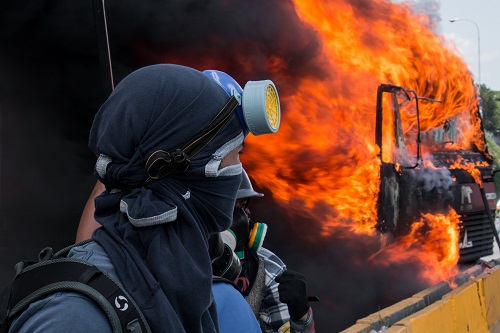Andrés Gerlotti photo
By
Ricardo Swire
The Caribbean and Venezuela are regional neighbors. Barbados is only 843 kilometers, or 524 miles from the Bolivarian Republic on South America’s north coast, the Bridgetown port 455 nautical miles from La Guaira Maracaibo and Puerto Cabello in Venezuela. Caribbean internal security intelligence data chronicles the consequences of escalated tensions between Venezuela and America.
Diplomatic gerrymandering partially fuels the regional drugs and arms trafficking trade. More aggressive crime and violence, committed with weaponry stolen and smuggled from Venezuelan armories, adds to landscapes of neighboring Caribbean islands. In the recent past Venezuela’s escalated border disputes with Guyana influenced political officials in Caracas to tactfully consolidate relationships with the Organization of Eastern Caribbean States (OECS), Trinidad & Tobago and Suriname.
Venezuela’s PetroCaribe oil concessions and infrastructural development assistance programs used to befriend some Caribbean territories. In the global geo-strategic context PetroCaribe’s expansion was the mechanism for development of new worldwide voting blocs, tactfully demonstrated by Venezuela’s increased contributions to the Community of Latin American and Caribbean States or CELAC’s political vehicle.
Caracas’ foreign relations adjustment occurred while America and Europe lessened high profile roles in the Caribbean, Chinese economic engagement increasing and Russia renewing its interest. St Vincent & the Grenadines (SVG) is the Anglophone Caribbean nation closest to Venezuela’s president. The completion of Argyle International Airport was partially financed by Venezuelan state contributions, Caracas donating US$10 million in equipment, three wind stations and a Cuban/Venezuelan soil testing laboratory.
The South American nation lent SVG EC$27 million from a special PetroCaribe Fund, at two percent interest over twenty-five years, as pay back the SVG government delimiting maritime boundaries. The Bolivarian Republic’s top politician also formed a strategic alliance with Antigua via financial investments. Antigua’s Prime Minister called the Venezuelan agreement “a new economic paradigm emerged that will involve taking the best aspects of capitalism to generate profits for the collective benefits of the masses.” Another OECS member, Grenada, officially negotiated with Venezuela about offshore oil and gas exploration.
Venezuela began purchasing rice from Suriname instead of Guyana as originally practiced. Caracas based national security representatives entered a collaborated security and information sharing arrangement with Trinidad & Tobago (T&T), in March 2015 Venezuela’s National Assembly empowering the President with authority to legislate by decree, the expanded powers allocated to counter an envisioned threat from Washington. Not long before, the U.S. President signed an executive order denouncing the Latin American nation as an “extraordinary threat to the national security of the United States.”
Sanctions were imposed on seven Venezuelan military and intelligence officials accused of human rights violations. After Venezuela’s President introduced the “Constituent Assembly” in July 2017 United States diplomatic pressure increased, the controversial legislative superbody having power to legislate bypassing the national Congress. On August 11, 2017 the U.S. President waned that Washington weighed several options to address Venezuela’s political complications and internal security challenges, “including a possible military option if necessary.”
On Friday August 25, 2017 America officially activated sanctions against Venezuela, an extra push against the Bolivarian State’s illegitimacies, instead of the President and inner-circle exclusively. Such sanctions take deep bites of cash from Petroleos de Venezuela (PDVSA)’s subsidiary Citgo, based in the Energy Corridor area of Houston Texas, the U.S. refiner, transporter and marketer’s dividends initially dispatched to Venezuela now restricted.
Venezuelan government bonds, issued to avoid Western financial market isolation were also banned. The U.S. diplomatic action and restrictions prompted the backlash, show of force, twenty-four hour National Bolivarian Armed Forces (FANB) countrywide military exercise. From Thursday August 24, 2017 to Saturday August 26, 2017 the FANB’s 200,000 soldiers, aircraft, mechanized warfare equipment, combined with 700,000 reserves and civil militia personnel, completed one day of rifle practice and a day of combat manoeuvres.
Ricardo Swire
Ricardo Swire is the Principal Consultant at R-L-H Security Consultants & Business Support Services and writes on a number of important issues.



No Comments Yet!
You can be first to comment this post!